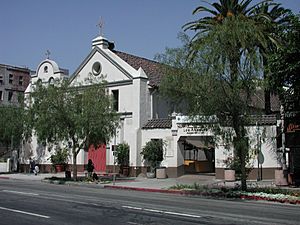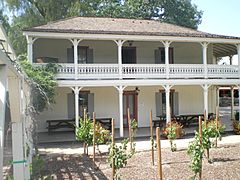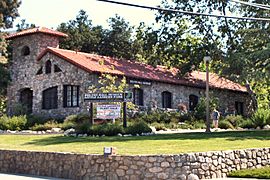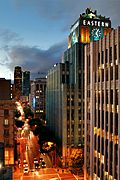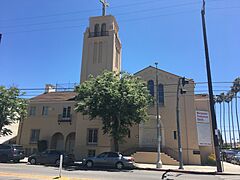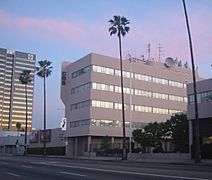Los Angeles Historic-Cultural Monument facts for kids
Los Angeles Historic-Cultural Monuments are special places in Los Angeles, California, that are important to the city's history, culture, or architecture. A group called the Cultural Heritage Commission chooses these sites to make sure they are protected and remembered.
Contents
Why We Protect Historic Places
In 1958, a group of architects in Los Angeles formed a committee. They noticed that many old, important buildings were being torn down as the city grew. They wanted to save these historic places.
This committee worked with other groups and city leaders. Their goal was to create a plan to protect Los Angeles's history. On April 30, 1962, their idea became a city law. This law created the Historic-Cultural Monument program.
The First Monuments Chosen
In the summer of 1962, the first Cultural Heritage Board was formed. This board later became known as a commission. Its members were William Woollett, Bonnie H. Riedel, Carl S. Dentzel, Senaida Sullivan, and Edith Gibbs Vaughan.
They had their first meeting in August 1962. At that time, someone wanted to tear down the old Leonis Adobe building to build a supermarket. On their very first day, the board quickly named the Leonis Adobe and four other sites as Historic-Cultural Monuments. This helped save them!
How Many Monuments Are There?
In its first ten years (from August 1962 to August 1972), the commission named 101 properties as Historic-Cultural Monuments. By April 2018, there were more than 1,150 special places protected in Los Angeles.
How a Place Becomes a Monument
When a building or site is named a Historic-Cultural Monument, it doesn't mean it can never be changed. However, if someone wants to tear it down or make big changes, they must first get permission from the commission.
The commission can even delay the demolition of a protected property for up to one year. This gives people time to find ways to save the building or find a new use for it.
Famous Los Angeles Monuments
-
Leonis Adobe (Monument #1)
-
Bolton Hall (Monument #2)
-
Eastern Columbia Building (Monument #294)
-
Westminster Presbyterian Church (Los Angeles) (Monument #299)
Important Monuments Outside Los Angeles
Some Historic-Cultural Monuments are located just outside the main city of Los Angeles, but they are still important to the region's history.
| Monument # | Landmark Name | Image | Date Chosen | Location | Area | What Makes It Special |
|---|---|---|---|---|---|---|
| 160 | Manzanar |  |
September 15, 1976 | Highway 395 36°43′42″N 118°9′16″W / 36.72833°N 118.15444°W |
Inyo County, California | This site was an important historical location during World War II. It is located in the Owens Valley. |
Find More Los Angeles Monuments
- Monuments in Downtown Los Angeles
- Monuments on the East and Northeast Sides
- Monuments in the Harbor Area
- Monuments in Hollywood
- Monuments in the San Fernando Valley
- Monuments in Silver Lake, Angelino Heights, and Echo Park
- Monuments in South Los Angeles
- Monuments on the Westside
- Monuments in the Wilshire and Westlake Areas
See also
- City of Los Angeles' Historic Preservation Overlay Zones
- National Register of Historic Places listings in Los Angeles
- List of California Historical Landmarks
 | Percy Lavon Julian |
 | Katherine Johnson |
 | George Washington Carver |
 | Annie Easley |


